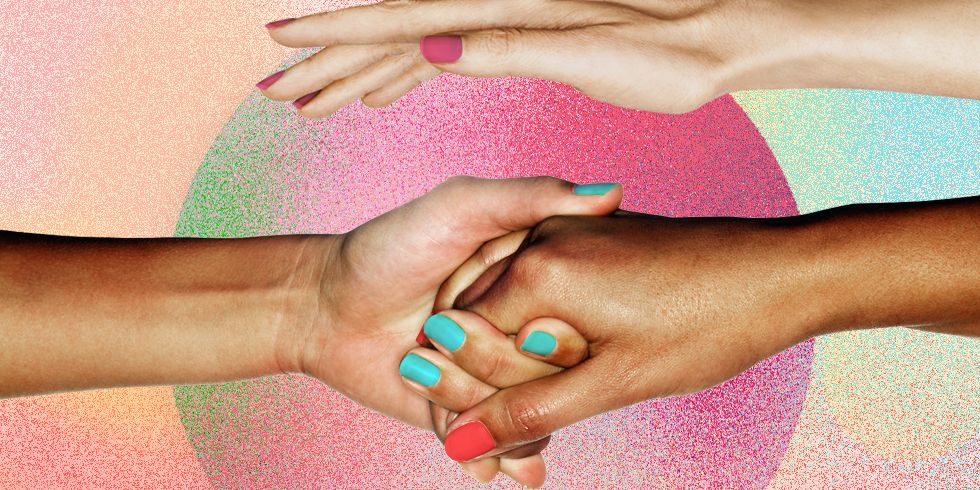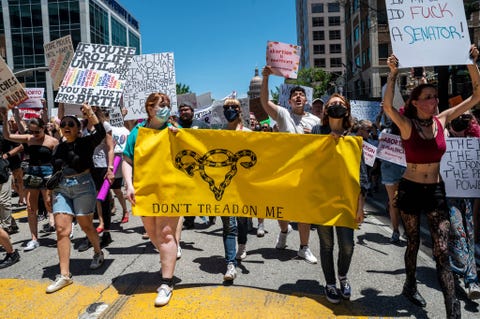Most days, Olivia* feels like she’s drowning. Overwhelmed by the stress of protecting her two young children amid a contentious divorce from her abusive husband, she is too afraid to make the phone call herself, so she asks a friend to set up an appointment with Renée Monteil of Sacred Moon Doula. When Renée arrives to meet her, the two women travel together to the clinic, passing through the gauntlet of sidewalk protesters draped in rosary beads and shouting a stream of threats and insults disguised as prayers, and enter through the front door.
New Hampshire, where Olivia has come to obtain her prescriptions for mifepristone and misoprostol, the combination of drugs used to end an early pregnancy, is poised to become the 28th state in the nation to mandate that an ultrasound procedure be performed before an abortion—regardless of medical necessity and irrespective of the patient’s wishes or the provider’s recommendations. Renée squeezes Olivia’s hand and strokes her hair as she lays back on the examination table, wiping away the young mother’s tears as the nurse readies the imaging wand for vaginal insertion. “Here is this woman…sobbing, trying to do what is right to keep her and her children safe,” Monteil told me from her home in Keene, NH. “I stayed with her the entire time that everything was explained to her (by the doctor), how to take the medication and what to look for during the pregnancy release. I had to have someone take care of my two daughters so that I could support this mother.”
Abortion has existed for as long as pregnancy has existed, and so have doulas—non-medical caregivers who partner with pregnant people to ensure that their needs are met and provide an additional layer of protection from the institutional biases and cultural stigmas that can create or exacerbate lasting trauma. While having a legal abortion is actually safer than giving birth and the simple medical procedure itself is not inherently traumatic, this country has made it nearly impossible to access without enduring harassment, undue financial burden, and acute psychological stress along the way. And all of that, abortion doulas say, was before the current wave of terrifying anti-abortion legislation explicitly targeting their clients and their work.
This has been the worst year for abortion rights in U.S. history. No matter where you live in the country, the sheer volume and scope of frightening bills emerging from legislative sessions in 2021 alone has been astounding, and it’s easy to have missed any of the 90 individual abortion restrictions that have already passed at the state level as we’ve found ourselves bracing for the worst: a possible reversal of Roe v. Wade. Though the majority of Americans are pro-choice, the majority of SCOTUS justices demonstrably are not.
Bills that should terrify any American with a cervix—and anyone who loves them—are being signed into law at a breakneck pace in attempts to trigger that reversal. Many of these laws allow no exceptions for rape or incest, and some are unprecedented in their extremity and cruelty; Texas’ Senate Bill 8, which empowers private citizens to file lawsuits against any other private citizen whom they believe to be connected to or involved in someone’s abortion in even the most peripheral ways—and even incentivizes them with a $10,000 bounty—went into effect Wednesday at midnight, effectively banning abortion in Texas.
When a person ends a pregnancy, they are cared for in various official capacities by a range of medical professionals at each stage of the process: counselors, nurses, doctors, patient advocates. But there’s also an entire village of people in that person’s life, extending far beyond the walls of the clinic, who are ready to provide them with countless other forms of care. The reach of S.B. 8—which criminalizes anyone from the pastor or rabbi who offers spiritual guidance to someone considering an abortion, to the owner of the motel that shelters them, to the friend who drives them to their follow-up appointment—lays bare the sheer number of often loosely connected individuals and organizations required to make just one abortion happen.
That care can look like practical or emotional support: a neighbor who watches your kids, a colleague who covers for you at work so you can take a sick day, a local volunteer-run abortion fund that helps you pay for your procedure, someone who holds your hand and shares a magazine in the waiting room. Often, multiple support roles are performed by a single, crucial person: an abortion doula.
Some weeks ago, when I asked Jenna “JB” Brown, a full-spectrum doula (meaning one who offers non-medical support to a pregnant person regardless of their pregnancy’s outcome) living and working in Austin, how they were processing the news of S.B. 8’s passage, JB told me: “The same way I have processed every egregious piece of anti-abortion legislation that has been passed in my adult life—by trusting that it won’t take effect.” JB, who operates in private practice with Love over Fear Wellness and Birth and goes by both they/them and he/him pronouns interchangeably, was desperately holding onto hope that the bill would somehow be stopped in its tracks before the Sept. 1 deadline in order to maintain the emotional baseline of inner peace and strength that is required get through workdays spent caring for others. JB knows what is at stake in the fight to keep abortion care legal and safe: human lives.
“People talk a lot about what would happen if S.B. 8 or other restrictive laws pass here in Texas, or if Roe v. Wade is overturned,” JB told ELLE.com, “but one thing I don’t often hear people say, as a matter of fact, is that people will die.”
Alarmingly, JB has already seen a sharp increase in the number of potential clients who are terrified to ask for help or information, and in the number of Texans he encounters who don’t realize that, even before the law took effect, it was still entirely legal for them to exercise their legal right to access abortion care.
“The press and the attention [S.B. 8] has received—coupled with people’s misunderstandings of our legal systems, which is by design—means that many people will remain misinformed in their options and the risks associated with those options,” JB said. “Even conversation around S.B. 8 decreases access to life-saving abortion services by stirring fear.”
That language of fear, weaponized so effectively by the authors of these bills, is echoed in the terror, humiliation, and shame expressed to doulas by the people who the laws are designed to punish and harm (the majority of whom are already parents, and a large share of whom identify as either Catholic or Christian). The burden of this fear and secrecy is largely borne by those who are disproportionately targeted and criminalized by our legal systems, who already face the largest barriers to healthcare of any kind, and who already live in fear of prosecution, incarceration, and abuse: people of color.
Much of a doula’s work centers on affirmation of the choices that their clients already know are best for their own bodies, families, and lives. Monteil, the veteran doula working with Olivia in New Hampshire, told me after the appointment, “She was crying that God would be angry with her. I told her that there was no way that any god would be angry with her for trying to do what is right for her and her children.”
Now, Monteil is reeling from the passage of the first abortion ban in her state’s history, a law that would see providers of post-24-week termination charged with a Class B felony, regardless of the health and safety of the pregnant patient or the viability of the fetus (the two reasons that such terminations are usually performed). Many doulas are seeing more clients in their homes, assisting in self-managed medical abortions using medications obtained online and providing post-abortion care, and trying as best they can to educate and support their communities through the compounding stresses of COVID-19, the social, physical and financial hardships of pregnancy, and the relentless march of these laws curtailing what sparse affordable healthcare most Americans have access to in the first place.
Brya Johnson, the founder of Abundant Spirit Birth Services in St. Louis, is forced to help her clients choose between two unthinkably burdensome choices: Missouri’s one remaining abortion clinic, with a mandatory 72-hour waiting period (which is almost impossible for those working low-wage hourly jobs with no paid sick leave), or traveling across the river to Illinois, which is also costly and time consuming, and not an option for the many patients with no access to childcare or transportation.
It is natural to feel helpless in the face of proliferating barriers like these, and the evident suffering caused by their cruelty. Pro-abortion rights voters may assume that the only way to fight legislation is with more legislation, to counter policy is with more policy. But doulas work outside courtrooms and legislative chambers. They operate within a framework of radical love and compassionate interpersonal care, powerful political weapons in their own right. And they are teaching others to do the same.
There is a growing network of grassroots organizations, training programs, and guides—both for those who are interested in becoming certified doulas themselves and those who simply wish to help pregnant people in all the small and human ways that laws like S.B. 8 are intended to criminalize. Online resources like The Doula Project and Birthing Advocacy Doula Trainings are free educational tools to make doula work accessible to everyone—an evergreen necessity considering that everyone knows someone who will need abortion care at some point over the course of their lifetime.
On the rapidly shifting landscape of reproductive healthcare—where the rules are increasingly arbitrary and needlessly punitive, invented and enforced at the whims of those with little-to-no actual understanding of what abortion care actually entails—doulas are staying the course. They refuse to be intimidated or deterred by the escalating rhetoric and overreach of the anti-abortion minority.
“Abortion work will continue as it always has—underground, with limited resources, despite the risks,” JB tells ELLE.come from his home in central Texas. “Restricting or rescinding access to safe, affordable abortion is injustice. And there will always be people fighting for justice.”
*Name has been changed.
This content is created and maintained by a third party, and imported onto this page to help users provide their email addresses. You may be able to find more information about this and similar content at piano.io

